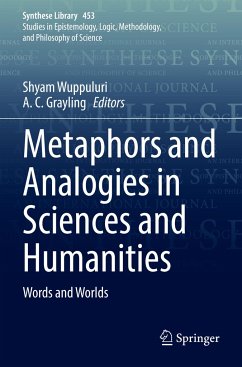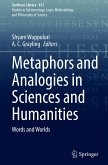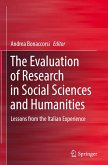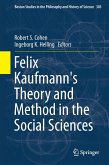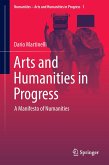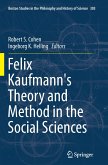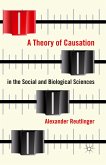Metaphors and Analogies in Sciences and Humanities
Words and Worlds
Herausgegeben:Wuppuluri, Shyam; Grayling, A. C.
Metaphors and Analogies in Sciences and Humanities
Words and Worlds
Herausgegeben:Wuppuluri, Shyam; Grayling, A. C.
- Broschiertes Buch
- Merkliste
- Auf die Merkliste
- Bewerten Bewerten
- Teilen
- Produkt teilen
- Produkterinnerung
- Produkterinnerung
In this highly-interdisciplinary volume, we systematically study the role of metaphors and analogies in (mis)shaping our understanding of the world. Metaphors and Analogies occupy a prominent place in scientific discourses, as they do in literature, humanities and at the very level of our thinking itself. But when misused they can lead us astray, blinding our understanding inexorably. How can metaphors aid us in our understanding of the world? What role do they play in our scientific discourses and in humanities? How do they help us understand and skillfully deal with our complex…mehr
Andere Kunden interessierten sich auch für
![Metaphors and Analogies in Sciences and Humanities Metaphors and Analogies in Sciences and Humanities]() Metaphors and Analogies in Sciences and Humanities103,99 €
Metaphors and Analogies in Sciences and Humanities103,99 €![The Evaluation of Research in Social Sciences and Humanities The Evaluation of Research in Social Sciences and Humanities]() The Evaluation of Research in Social Sciences and Humanities74,99 €
The Evaluation of Research in Social Sciences and Humanities74,99 €![Felix Kaufmann's Theory and Method in the Social Sciences Felix Kaufmann's Theory and Method in the Social Sciences]() Felix Kaufmann's Theory and Method in the Social Sciences103,99 €
Felix Kaufmann's Theory and Method in the Social Sciences103,99 €![Arts and Humanities in Progress Arts and Humanities in Progress]() Dario MartinelliArts and Humanities in Progress37,99 €
Dario MartinelliArts and Humanities in Progress37,99 €![Felix Kaufmann's Theory and Method in the Social Sciences Felix Kaufmann's Theory and Method in the Social Sciences]() Felix Kaufmann's Theory and Method in the Social Sciences103,99 €
Felix Kaufmann's Theory and Method in the Social Sciences103,99 €![A Theory of Causation in the Social and Biological Sciences A Theory of Causation in the Social and Biological Sciences]() A. ReutlingerA Theory of Causation in the Social and Biological Sciences37,99 €
A. ReutlingerA Theory of Causation in the Social and Biological Sciences37,99 €![Human Extension: An Alternative to Evolutionism, Creationism and Intelligent Design Human Extension: An Alternative to Evolutionism, Creationism and Intelligent Design]() Gregory SandstromHuman Extension: An Alternative to Evolutionism, Creationism and Intelligent Design37,99 €
Gregory SandstromHuman Extension: An Alternative to Evolutionism, Creationism and Intelligent Design37,99 €-
-
-
In this highly-interdisciplinary volume, we systematically study the role of metaphors and analogies in (mis)shaping our understanding of the world. Metaphors and Analogies occupy a prominent place in scientific discourses, as they do in literature, humanities and at the very level of our thinking itself. But when misused they can lead us astray, blinding our understanding inexorably. How can metaphors aid us in our understanding of the world? What role do they play in our scientific discourses and in humanities? How do they help us understand and skillfully deal with our complex socio-political scenarios? Where is the dividing line between their use and abuse? Join us as we explore some of these questions in this volume.
Produktdetails
- Produktdetails
- Synthese Library 453
- Verlag: Springer / Springer International Publishing / Springer, Berlin
- Artikelnr. des Verlages: 978-3-030-90690-0
- 1st ed. 2022
- Seitenzahl: 616
- Erscheinungstermin: 1. Juni 2023
- Englisch
- Abmessung: 235mm x 155mm x 33mm
- Gewicht: 920g
- ISBN-13: 9783030906900
- ISBN-10: 3030906906
- Artikelnr.: 67880236
- Synthese Library 453
- Verlag: Springer / Springer International Publishing / Springer, Berlin
- Artikelnr. des Verlages: 978-3-030-90690-0
- 1st ed. 2022
- Seitenzahl: 616
- Erscheinungstermin: 1. Juni 2023
- Englisch
- Abmessung: 235mm x 155mm x 33mm
- Gewicht: 920g
- ISBN-13: 9783030906900
- ISBN-10: 3030906906
- Artikelnr.: 67880236
Shyam Wuppuluri is an independent researcher working in the domain of foundations of science. He is currently working as a research associate at R. N. Podar institute. His research interests range from philosophy to theoretical physics, mathematics and cognitive science. He is the recipient of Honra ao Merito from the Brazilian Academy of Philosophy (Academia Brasileira de Filosofia) and is also a corresponding member of the academy since 2018. He is also the recipient of prestigious Albert Einstein Fellowship 2020 from the Einstein Forum at Potsdam & Caputh and a fellow of Royal Society of Arts. As a primary editor, he has edited various highly interdisciplinary volumes to disseminate and address the issues underlying the foundations of sciences by gathering world's leading scientists and intellectual leaders including Noam Chomsky, Sir Roger Penrose, Sir Martin Rees, Daniel Dennett, A. C. Grayling, Nicholas Humphrey, Gregory Chaitin, Gerard 't Hooft, Ian Stewart, Barry Mazur, Stephen Wolfram, Paul Davies, Tyler Burge, Doron Swade, Julian Barbour, Newton Da Costa, Francisco Antonio Doria, Reuben Hersh, Nicholas Maxwell and many others. A. C. Grayling is Master of the New College of the Humanities, and a Supernumerary Fellow of St Anne's College, Oxford. Until 2011 he was Professor of Philosophy at Birkbeck College, University of London. For several years he wrote the "Last Word" column for the Guardian newspaper and a column for the Times. He is a frequent contributor to the Literary Review, Observer, Independent on Sunday, Times Literary Supplement, Index on Censorship and New Statesman, and is an equally frequent broadcaster on BBC Radios 4, 3 and the World Service. He writes the "Thinking Read" column for the Barnes and Noble Review in New York. In addition he sits on the editorial boards of several academic journals, and for nearly ten years was the Honorary Secretary of the principal British philosophical association, the Aristotelian Society. He is a past chairman of June Fourth, a human rights group concerned with China, and is a representative to the UN Human Rights Council for the International Humanist and Ethical Union. He is a Vice President of the British Humanist Association, the Patron of the United Kingdom Armed Forces Humanist Association, a patron of Dignity in Dying, and an Honorary Associate of the National Secular Society. Grayling is a Fellow of the Royal Society of Literature and a Fellow of the Royal Society of Arts.
Preface.- Introduction.- Philosophy and Sciences. Part I. Philosophy and Foundations of Sciences. 1. Syntactically recharacterizing analogies, assessing theories of assessing analogies by Jody Azzouni.- 2. The Metaphoric Sources of Scientific Innovation by Sergio F. Martínez and Natalia Carrillo.- 3. Science, Metaphors, and Memes by Peter Ludlow.- 4. Demystifying mysteries. How metaphors and analogies extend the reach of the human mind by Maarten Boudry, Michael Vlerick and Taner Edis.- Part II. Mathematics. 5. A two-level model of embodied mathematical thinking: Body schema, body image and language by Valentina Cuccio, Mario Graziano.- 6. Synthesis and similarity in science: analogy in the application of mathematics and application of mathematics to analogy by Jordi Cat.- 7. Metaphor and its catenary curves by Alice Major.- 8. Mathematical Models and Analogical Reasoning by Mark Colyvan.- Part III. Theoretical Physics. 9. Analogies and Scientific Imaging by Otávio Bueno.- 10. Analogies and Metaphors in Physics by Dennis Dieks.- 11. Is the Brain Analogous to a Quantum Measuring Apparatus? by Paavo Pylkkänen.- Part IV. Biology/Cognitive Science. 12. "Decoding information": The abuse of personification and machine metaphors by David Ritchie.- 13. The Metaphorical Role of the Histone Code by Gry Oftedal.- 14. Analogical and non-analogical resemblance in figurative language: a cognitive-linguistic perspective by Francisco José Ruiz de Mendoza Ibáñez.- 15. Inner and Outer: FrpAom Skepticism to Understanding by Edward Witherspoon.- Humanities. Part V. Social Sciences.- 16. From words to worlds. How metaphors and language shape mental health by Francesca Brencio.- 17. Mapping friendship and friendship research: the role of analogies and metaphors by Claus Emmeche.- 18. Words and worlds of desire: the power of metaphor in framing sexuality by Veronika Koller.- 19. The Human Condition is an Ocean: Philosophy and the Mediterranean Sea by Annika Döring and Rasmus Grønfeldt Winther.- 20. Universality and/or cultural specificity of metaphors and analogies? NATIONS as BODIES/PERSONS by Andreas Musolff.- 21. Metaphors in times of a global pandemic by Brigitte Nerlich.- 22. Fluffy metaphors of an overheated debate: Why climate change is neither communicated nor understood as an existential threat? by Bálint Forgács and Csaba Pléh.- Part VI. Arts and Aesthetics. 23. Mediterranean Sea-Creature: Maritime Metaphor in the Philosophy of Friedrich Nietzsche by Annika Döring and Peregrine Horden.- 24. How to See: The Gaze in Iris Murdoch's Moral Philosophy by Hibi Pendleton.- 25. From statics to dynamics: Intersemiotic conversion of metaphor and its consequences by Milos Tasic & Dusan Stamenkovic.- 26. Form, Meaning and Intentionality: The Case of Metaphor in Music by Mihailo Antovic.- 27. From Philosophy to Architecture to Philosophy: Boundary and Metaphor in Wittgenstein by Nana Last.
Preface.- Introduction.- Philosophy and Sciences. Part I. Philosophy and Foundations of Sciences. 1. Syntactically recharacterizing analogies, assessing theories of assessing analogies by Jody Azzouni.- 2. The Metaphoric Sources of Scientific Innovation by Sergio F. Martínez and Natalia Carrillo.- 3. Science, Metaphors, and Memes by Peter Ludlow.- 4. Demystifying mysteries. How metaphors and analogies extend the reach of the human mind by Maarten Boudry, Michael Vlerick and Taner Edis.- Part II. Mathematics. 5. A two-level model of embodied mathematical thinking: Body schema, body image and language by Valentina Cuccio, Mario Graziano.- 6. Synthesis and similarity in science: analogy in the application of mathematics and application of mathematics to analogy by Jordi Cat.- 7. Metaphor and its catenary curves by Alice Major.- 8. Mathematical Models and Analogical Reasoning by Mark Colyvan.- Part III. Theoretical Physics. 9. Analogies and Scientific Imaging by Otávio Bueno.- 10. Analogies and Metaphors in Physics by Dennis Dieks.- 11. Is the Brain Analogous to a Quantum Measuring Apparatus? by Paavo Pylkkänen.- Part IV. Biology/Cognitive Science. 12. "Decoding information": The abuse of personification and machine metaphors by David Ritchie.- 13. The Metaphorical Role of the Histone Code by Gry Oftedal.- 14. Analogical and non-analogical resemblance in figurative language: a cognitive-linguistic perspective by Francisco José Ruiz de Mendoza Ibáñez.- 15. Inner and Outer: FrpAom Skepticism to Understanding by Edward Witherspoon.- Humanities. Part V. Social Sciences.- 16. From words to worlds. How metaphors and language shape mental health by Francesca Brencio.- 17. Mapping friendship and friendship research: the role of analogies and metaphors by Claus Emmeche.- 18. Words and worlds of desire: the power of metaphor in framing sexuality by Veronika Koller.- 19. The Human Condition is an Ocean: Philosophy and the Mediterranean Sea by Annika Döring and Rasmus Grønfeldt Winther.- 20. Universality and/or cultural specificity of metaphors and analogies? NATIONS as BODIES/PERSONS by Andreas Musolff.- 21. Metaphors in times of a global pandemic by Brigitte Nerlich.- 22. Fluffy metaphors of an overheated debate: Why climate change is neither communicated nor understood as an existential threat? by Bálint Forgács and Csaba Pléh.- Part VI. Arts and Aesthetics. 23. Mediterranean Sea-Creature: Maritime Metaphor in the Philosophy of Friedrich Nietzsche by Annika Döring and Peregrine Horden.- 24. How to See: The Gaze in Iris Murdoch's Moral Philosophy by Hibi Pendleton.- 25. From statics to dynamics: Intersemiotic conversion of metaphor and its consequences by Milos Tasic & Dusan Stamenkovic.- 26. Form, Meaning and Intentionality: The Case of Metaphor in Music by Mihailo Antovic.- 27. From Philosophy to Architecture to Philosophy: Boundary and Metaphor in Wittgenstein by Nana Last.

